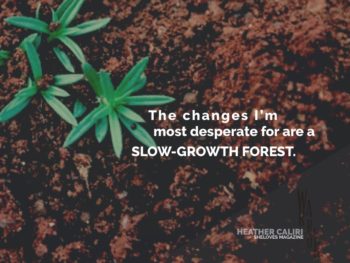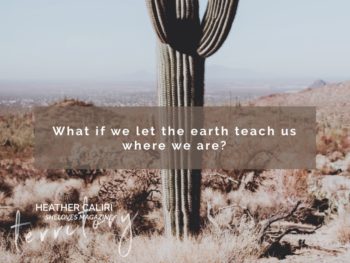Do you ever feel guilty about how homogenous your friends are? Do you avoid multicultural situations or conversations about race and ethnicity because you’re terrified of making a mistake? Do you wish you knew how to get over yourself and follow Christ’s lead as a reconciler? I’m learning a ton from Christena Cleveland’s wise posts on race, privilege, and how to work as a reconciler if you’re a privileged person. The problem is, words like “privilege”, “justice” or “racial reconciliation” sometimes sound too big for a normal person like me to do anything about. So we talked about what it looks like for a beginner to pursue reconciliation. Read on for her response.

In the Christian Examiner article you linked to on your website, I was pretty excited to see you say, “Baby steps are important,” since that’s what I focus on here. Why do you think baby steps are important for reconciliation?
I think of reconciliation as a journey in the same way that discipleship is a journey. God can open our eyes to the need for reconciliation as a sort of second conversion. We wouldn’t expect someone who just became a Christian to start preaching or leading; instead, they would focus on smaller acts of faith. Reconciliation is parallel to that. I think growing in reconciliation is overwhelming to people. It’s hard when you see the discrepancy between your heart and God’s for the first time.
Can you think of baby steps—either yours or someone else’s—that led to real reconciliation in your life?
I am a big fan of taking a cross-cultural relationship that I already have, and being intentional about building that friendship. It ends up turning into reconciliation work. But it begins with just hanging out, listening, and hearing their concerns.
For me, it is so validating when someone outside my culture really listens to me and hears my perspective. It is so small, but it’s so important.

What is so powerful about listening?
It builds bridges.
We live in such a segregated world. And the idea of building bridges seems overwhelming, because we don’t know anything about other peoples’ lives. But the truth is, we have a lot in common. We know how to form relationships, so it’s best to start there.
I was just talking to a woman about building relationships across socio-economic lines. The more she listens, the more she can approach others, have strategies, and know how to ask honoring questions. She learns how to be a friend, how to speak, how to offer to help. Those are the uncertainties that make people hesitant. Listening can bridge that and help you bond.
What advice would you give to parents who desire to foster a spirit of reconciliation in their kids?
First, model it for them. Make sure that you have friends who are different, who are from different religious backgrounds. And not just relationships to “evangelize”, but real friendships.
I would also tell parents to be explicit about multicultural values. Our society really conditions people to be homogenous.
So you have to be explicit. “No, we don’t perceive people this way,” or, “We are going to go to this church because it’s more diverse.” Make sure you have the conversations. Kids notice racial differences, and will make assumptions based on what they see. So you have to be intentional about choosing friend groups and having conversations.
As I start pursuing more intentionally heterogeneous relationships, I find I balk when the steps towards reconciliation are slow or mundane. What’s the connection between being privileged and being impatient?
I think it comes from having agency. You’re used to making things happen.
I learn so much from my own family members who live with more dependence on God. They model that attitude for me. They really teach me–and others–that it’s good to wait on God. It’s good to ask God to come through for you.
Privileged people don’t usually have to live that out. But that’s actually where holiness is. So often, the privileged are blind to it.
I think that’s one reason why we have to seek out relationships with oppressed people—they have the keys to the kingdom. It’s the beatitudes, come to life.
What are the risks for each side in a relationship between more- and less-privileged people?
It’s harder to be the oppressed person in the relationship. You’re taking all the risk. The smartest thing to do, really, is to stay away from people with privilege, because they probably haven’t thought about how their privilege impacts you. So it comes at great cost.
For the privileged person, the challenge is to lose one’s self in the process. The privileged person tends to be more individualistic, and to benefit from a society that is set up for them. So it’s hard to get into an other-centered place.
Often, a privileged person will do well for a while, then drop back into patterns of domination. They’ll offer to give a ride, say, but then get annoyed when the schedule doesn’t work for them.
You’re trying to retrain your way of thinking, to download new DNA after living your whole life with these accommodations. You’re trying to think differently, act differently, and be okay with the fallout.
I know several white men who have been doing reconciliation work for twenty years—and the thought patterns are still not ingrained in them. They still have to work at it.
That’s another reason to talk about this stuff with kids—they don’t get so programmed.
In the comments, I’d love to hear your ideas about how to take a tiny baby step this week towards reconciliation with other cultures and ethnicities. Can you listen, learn, reach out, talk to your kids? It’s okay for your step to be a pre- pre- baby step! Let’s encourage each other to be intentional.
Image credits: Steven Shorrock, WoodleyWonderWorks, and Christena Cleveland
 Christena Cleveland is a social psychologist with a hopeful passion for overcoming cultural divisions in groups. Drawing from a vast body of research, she uncovers the underlying processes that affect relationships within and between groups and helps leaders understand how to promote an appreciation for diversity and build effective collaborations with diverse groups. She recently completed her first book Disunity in Christ: Uncovering the Hidden Forces that Keep Us Apart.
Christena Cleveland is a social psychologist with a hopeful passion for overcoming cultural divisions in groups. Drawing from a vast body of research, she uncovers the underlying processes that affect relationships within and between groups and helps leaders understand how to promote an appreciation for diversity and build effective collaborations with diverse groups. She recently completed her first book Disunity in Christ: Uncovering the Hidden Forces that Keep Us Apart.















I love this post for so many reasons!!!!
Isn’t Christena so inspiring? I am so inspired to get up my gumption and pursue these relationships.
Thanks for this interview – you ask some really great questions! I appreciated Christina’s responses as well. It’s so true that you have to retrain your mind again and again. After being married interracially and interculturally for well over a decade, I still find myself slipping into old ways of thinking.
Thanks for the encouragement, Jody. (Wait, is it encouraging to be reminded how hard it is?) I am glad to know, I guess, that I’m not just lame 🙂